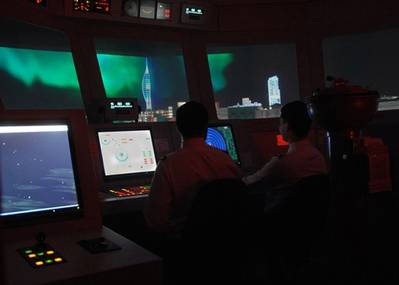Transas Upgrades British Navy Bridge Simulator
Britannia Royal Naval College's bridge simulator unit features photo-realistic recreations of key harbours for trainees to hone ship piloting skills.
"Whereas in the past you'd just see a row of houses, now there are specific buildings," explains Lieutenant Sam Stephens, head of navigation at Dartmouth.
Buildings such as the distinctive Wilton Hotel on Plymouth's Grand Parade. It's painted gold - like the real thing - and you can clearly read the lettering. The same goes for the Spice Island Inn in Portsmouth.
Portsmouth Harbour is the pièce de résistance of the upgrade. A graphics specialist from the simulator's developers Transas spent five days photographing every aspect of the waterfront and environs - by day and by night.
The simulator - which features the front section of a generic warship's bridge, plus giant display screens in a 180-degree arc to recreate the outside world - is powered by the equivalent of ten high-spec gaming computers.
The system can also recreate a lookout's view through binoculars, while the 'ship handling' characteristics - length, beam, displacement and the like - perfectly mirror most classes of ships in the fleet (the main exception presently being the new Type 45 destroyers).
As well as locations and harbours, which can be loaded in a matter of seconds, the computer recreates pretty much all sea and weather conditions one of Her Majesty's Ships might encounter: driving rain or snow, hurricanes, sandstorms and fogbanks.
That's not to say that the simulator is perfect, or, ultimately, a substitute for the real thing. It struggles with very heavy seas (winds of Force 10 and above) and especially waves over the bow. Turn it down a few notches to 6 or 7 and the realism returns: "I sat at the back of the room and watched a group of senior officers on a command course swaying around," says Lieutenant Stephens.
"Some people have even asked if it's on hydraulics. It's not. It simply tricks the mind."














